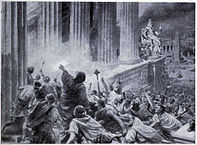Brian Carver

The Burning of the Library of Alexandria, an illustration from
‘Hutchinsons History of the Nations’, c. 1910.
At least since the destruction of the Ancient Library of
Alexandria, the world has
known the importance of having a backup. The
RECAP archive of documents from PACER is a
partial backup of documents taken offline by five federal
courts. It
is impossible to determine how complete a backup we have, because the
problem with missing documents is that you cannot even determine that
they are missing without a complete list of what used to be available.
No such lists exist for the documents from these five courts.
But as coverage of this surprising and unprecedented action by PACER
officials continues (see
techdirt),
the BBC has an article that takes an interesting approach by pointing
out some of the landmark civil rights cases taken off
PACER through this action.
The BBC mentions the case Ricci v. DeStefano which was decided at the
Second Circuit while Sonia Sotomayor was a Circuit Judge. Sotomayor,
now a Supreme Court Justice, had her role in deciding the case closely
scrutinized during her Supreme Court confirmation hearings. Many who dug
in to Sotomayor’s background during those hearings likely relied on the
documents available via PACER related to this and other cases she
decided. What will happen when the next individual from the Second,
Seventh, Eleventh, or Federal Circuit, is nominated for higher office?
Unless PACER officials make some accommodation, such as the one we
asked for
yesterday,
researchers and the public will face the daunting task of requesting these
materials individually, possibly in person, at excessive expense and
inconvenience for everyone involved.
And as I
told Common Dreams
, the Administrative Office of the Courts (AO) cannot argue that some of these
cases have been closed for “13 years.” Some were closed this year! They also
cannot argue that “many had not been accessed in several years” because as we
demonstrated in a recent video, it can be very
difficult and expensive to use PACER. Thus, PACER usage statistics should tell
us nothing about the importance of these files. And often, as was the situation
with Judge Sotomayor’s historical record, some cases only become particularly
interesting years later and for reasons possibly unrelated to the case itself.
Put another way, libraries should hang on to their copy of Plato’s
Crito, even if its been a few years since anyone checked it out.
This PACER situation presses home more than ever the importance of
having a backup. Many critics of the PACER system were dissatisfied with
many aspects of the AO’s custodianship of America’s judicial record,
but no critic ever thought that after so much work to move to online
electronic records, we would return to an offline system of access to
court records. If we now cannot even count on the courts to keep the
electronic records online, even if behind a byzantine paywall, then we
really must insist on a backup.
Source link




